There’s an unfathomable amount of personal information floating around on the internet and stored on our devices. Worse, we forget exactly what we have previously disclosed or what sensitive information lurks on our devices until it’s too late.
Hacking is gaining unauthorized access to data in a system or computer. This unauthorized access can take the form of collecting information, downloading dangerous software, or corrupting files. There are many ways to hack a system, but the emotional toll on the victim is certain.
The number of breaches increased roughly 273% during the first quarter of 2020. The number of cyberattacks and hackings has dramatically increased, and the pattern shows no sign of slowing down.
Celebrity Hacking Victims
Many celebrities have had their social media accounts, Apple iCloud accounts, and financial accounts hacked.
One of the most infamous instances of celebrity hacking victims include “Celebgate.” A team of hackers gained unauthorized access to people’s Apple iCloud accounts, resulting in nude photos and videos of several people being publicly posted.
Impacted by Celebgate:
- Jennifer Lawrence
- Kate Upton
- Kirsten Dunst
- Kaley Cuoco
… and close to 600 other accounts.
Whether famous or not, victims often receive unwanted attention after being publicly exposed. Jennifer Lawrence spoke about the experience: “I can’t even describe to anybody what it feels like to have my naked body shoot across the world like a news flash against my will. It just makes me feel like a piece of meat that’s being passed around for a profit.”
George Garofano, one of the four responsible, received eight months in prison for the crime. The other three received sentences between nine to 18 months in prison.
Everyday Hacking Victims
Victimized by the same perpetrator, many regular citizens had their Apple iCloud accounts hacked.
Hacking is not just reserved for high-profile targets and companies. Hacking can happen to anyone at any time.
Hackers also have gained sophistication in their methods of stealing information. They will frequently impersonate Amazon, banks, and other institutions over the phone, text, or email. Malicious actors know flashy pop-ups no longer have the same effect as 20 years ago.
As public awareness of common hacking methods increases, so does hackers’ sophistication. There are many cyber attacks people face. Phishing attacks, ransomware attacks, and viruses are just a few.
Arguably, the most sophisticated one is social engineering. Social engineering is when a hacker creates a likely scenario to manipulate someone into divulging personal information.
For example, let’s say your friend becomes a hacking victim. They might not even be the ones to give the hackers their sensitive information — any common data breaches at large companies could have caused this.
Now, hackers know you have been told by all cybersecurity sources to never open links from unknown sources. What does the hacker do to trick you into clicking the link?
The hacker emails all your friends’ contacts from his email address, telling you to click a link. They may phrase it as an act of desperation (“Help, my dog’s been injured, and I need you to donate five dollars!”) or casual (“This video reminded me of you.”)
Once you click the link, malware or viruses could begin installing.
Social engineering attacks are surprisingly effective. When cybercriminals victimize people, the consequences are devastating.
Social Engineering Attack In Action
In 2022, a Washington County woman’s bank account was hacked. All of her accounts were cleaned out and closed.
She first received a text message from the same text chain she uses with PNC alerting her to a potential fraudulent call. Once she replied, she received a phone call from a man claiming to be a PNC representative.
He asked her all of her security questions and even called her from the same phone number on the back of her PNC credit card. The second she gave him her user ID, she lost control.
Once the hacker gained access, he changed her password, took all her money, and locked her account. This woman is one of many who hackers victimized and stole their money.
Another woman who fell prey to a similar scam said, “I started to cry because I feel stupid. I feel victimized. I feel angry. I feel violated, and I feel embarrassed.”
The victimization hacking victims go through runs deep and imparts significant trauma. People have a right to use devices and applications without the worry of malicious actors, whether it’s a person’s privacy, money, or files.
You Need Personal Cybersecurity
Think about all the applications you use in your everyday life. Facebook, Instagram, your smart TV, Netflix, Hulu — each application you interact with is another vulnerable entry point for hackers to uproot your life. Each account holds valuable information that could be used to hack additional accounts.
As life increasingly integrates with technology, it’s important to prioritize your security and safety.
That’s why personal cybersecurity is relevant to everyone. Whether a tech CEO or a student, personal cybersecurity ensures that your bank account details, passwords, social media accounts, and other information are secured.
Agency, a cybersecurity company, offers business-level cybersecurity that prevents, monitors, and mediates cyber attacks if they were to arise.
Agency’s Personal Cybersecurity Plan Also Includes:
- 24/7 monitoring and response against cyber threats by cybersecurity experts
- VPNs
- Next-Gen Antivirus/EDR
- ID Theft Coverage
- Active Dark Web Monitoring
- Personal Information Removal
- Active Security Monitoring & Response by US Professionals
Take steps to protect your privacy and security by purchasing affordable personal cybersecurity! You could receive a free one-month trial by signing up for the newsletter.







